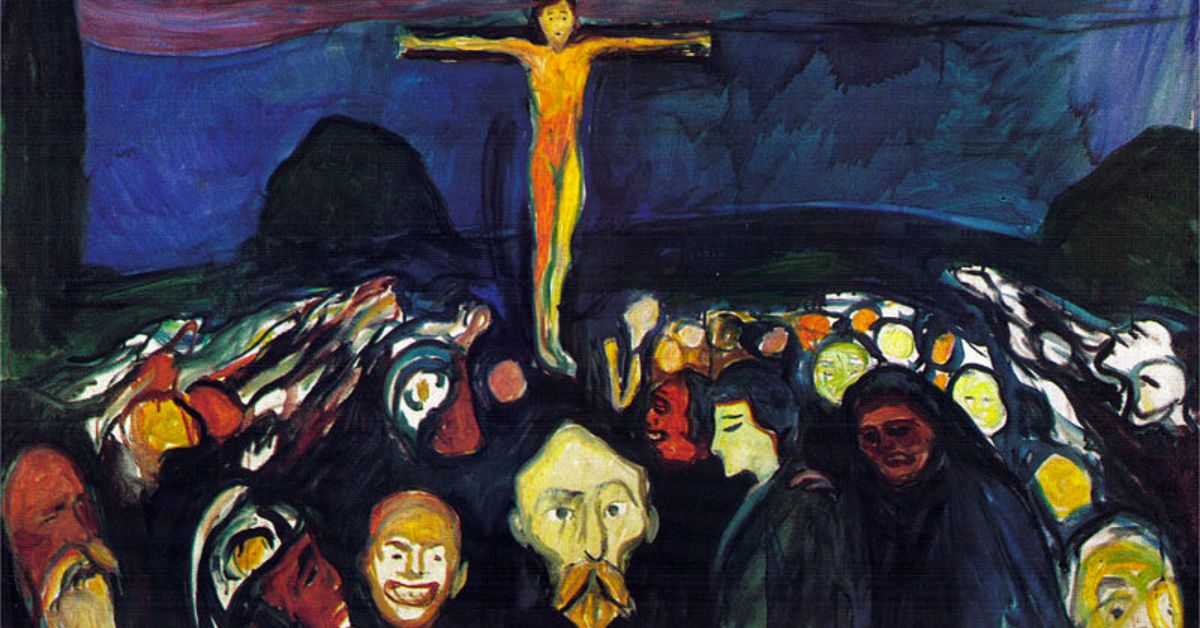We began Lent with stark words, as ashes were placed upon our foreheads in the sign of the cross, and we came face to face with human reality: Remember that you are dust, and to dust you shall return.
Trace your finger over your forehead even now. Can you feel it? The reminder? The truth? Sitting upon your forehead like a searing brand?
You are dust. You are dust. You are dust.
It’s strange, for the cross at Ash Wednesday mirrors another holy anointing–one we receive in our baptism.
As one who was baptized as an adult, I will never forget it.
A dear friend and mentor with oil on her fingertips, tracing the sign of the cross on my forehead, saying these words: Katie, child of God, you have been sealed by the Holy Spirit and marked with the cross of Christ forever.
And another promise: God loves you, Katie, and you belong to him, and he will never, ever let you go, no matter what.
Can they both be true?
The anointing with oil, sealing and light, and the imposition of ashes, dark and foreboding?
Spirit and dust, light and darkness.
They’re contradictions, aren’t they? They can’t possibly coexist.
The answer, of course, lies in the thing itself, in the very cross we wear like an invisible tattoo upon our foreheads.
It’s a mysterious thing, something we can neither grasp nor wave away.
It’s a puzzle, a paradox—and we hang in the balance between promise and surrender, life and death.
For on the one hand, the cross is an implement of state-sanctioned torture.
It is the most powerful preying upon those who are most weak.
It is the death of innocents, and all the horror such senseless death entails.
It is despair as deep as a bottomless well.
Think of your own greatest hurts: your betrayals, your losses, your regrets, your traumas.
This is the cross.
It shatters our pretending—when it’s so much easier to pretend sometimes, isn’t it?
We like to tell ourselves we’re invincible.
We like to think that advancements in modern science or breakthroughs in industry have made us nearly as powerful as gods.
We like to think we haven’t been hurt, or we haven’t hurt others—we can suck it up, move on, deflect, blame.
The cross breaks through all that. It shatters our pretenses.
No, things are not fine; no, we don’t have everything under control; no, we can’t out-smart or out-run or out-righteous or out-pray our sorrow, our addictions, our grief, our shame.
The cross draws us back to reality, again and again, when we’d rather look away.
We prefer our falsehoods and fantasies, but the cross forces us to confront what we’d rather ignore.
It breaks through the lies we tell ourselves, the difficult truths we fear we can never face, and says, Look.
LOOK!
Here is suffering. Here is violence. Here is death.
You will not escape it.
You are captive to it.
You are powerless over it.
You are dust. You are dust. You are dust.
And yet, in the same moment, the cross is a promise, unbreakable, sure.
The same cross that shatters our delusions and draws us into reality reveals a deeper reality, one we could have never predicted.
We are sealed, bound, to the God of the Universe.
Almighty God becomes weak for our sakes.
Jesus joins us in solidarity in death and pain.
He reveals love as deep as a bottomless well, deeper than our suffering, our despair.
Think of your own greatest hurts: your betrayals, your losses, your regrets, your traumas.
This is the cross.
It shatters our pretending—when it’s so much easier to pretend sometimes, isn’t it?
We like to tell ourselves we’re unworthy.
We like to think that no one could have sinned more grievously or been a bigger disappointment or failed more spectacularly.
We like to believe the worst things anyone has ever said about us, or insist to ourselves that somehow we deserved our abuse.
The cross breaks through all that. It shatters our pretenses.
Yes, we have inherent worth; yes, we are loved deeply and perfectly regardless of what we’ve done or left undone; yes, no matter how hard we try to out-smart or out-run or out-fail or out-sin the boundless and extravagant love of God, God will catch up with us again, because in the cross Jesus has claimed us and will never let us go.
The cross draws us back to reality, again and again, when we’d rather look away.
We prefer our falsehoods and fantasies, but the cross forces us to confront what we’d rather ignore.
It breaks through the lies we tell ourselves, the difficult truths we fear we can never face, and says, Look.
LOOK!
Here is love, the purest in all the universe, pursuing you relentlessly, tirelessly, even to the point of death.
You cannot escape it.
You are claimed by it.
You are reborn through it.
The cross upon our foreheads is the reality that God has joined us in our deepest sorrow, that he has traveled to the darkest recesses of hell to rescue us, and because of that, we belong to him.
And so, as Jesus hangs there, his arms outstretched, he is calling us.
He is saying, Bring it all to me: Your violence. Your anguish. Your heartache. Your sin. Your self-deception. Your grief. Your regrets. Your betrayals. Your trauma.
Bring it to me, cast it at my feet. Throw it down and never look back.
And I will make you a deal.
Your sorrow for my joy, your pain for my healing, your sin for my righteousness, your death for my life.
We are dust. We are dust. And in Jesus, God became dust for our sake, so that we might be raised to his life, now and forevermore.
Thanks be to God.
Amen.



